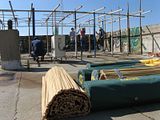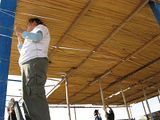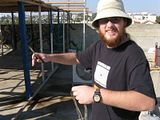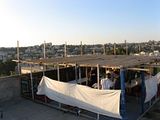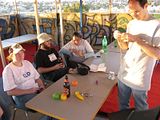It's taking me longer to post than it's taking my foot to heal
That's right. I sprained my ankle. This is what happens when you play basketball in running shoes.
I'm really only bummed out, besides the constant dull pain, because I won't be able to play on the Pardes flag football team for a couple of weeks. Sure, it isn't like I can run, catch, or throw with or without a bum ankle, but at least I can stand on the defensive line with my hands up.
So, first off, I want to apologize, to those that care, for not posting for so long. Maybe it comes down to a reflection on my writing; so often, I use my writing to sum up the intellectual gains I've had, the little steps on the road to betterdom. Here, though, every day I feel growth, every day I really feel I'm a better person than the last, and in a blog-esque way, it's hard to sum anything up without getting into the whole shebang. And as a month and a half of Torah study has shown, it's a big, big shebang.
I'll try to give a glimpse, at least.
On Tuesday evenings, I'm taking a extracurricular class on Hasidut with Levy Cooper. Levy is actually on sabbatical this year, but due to the demand for the class, he comes in once a week to teach. The Hasidut, for those who don't know, are members of several religious dynasties, many dating back to the mid-18th century. The Hassids are known as one of the more spiritually-minded sects of religious Judaism, and included in their midst are the Lubavitchers, who run the biggest Jewish outreach program in the world, Chabad.
In the course of this class, our mission is threefold. First, we're learning a bare-bones history of the Hassidic movement. Second, we're reading a classic Hassidic text, Ohev Yisroel. Lastly, through our "spiritual homework," we are trying to "try out" different Hassidic perspectives on living, trying to embody the more beautiful aspects of the Hassidic design. I'm still not sure if I'm going to find the fulfillment with the spiritual homework, but I'll try to expound on a basic Hassidic idea that I really found simple but beautiful.
Levy told us a story. Two men, best friends, were so close that their other friends all told them that they were nearly the same person. They were inseperable. On a trip to Israel, they decided they wanted to hike up Masada, the mountain fortress near the Dead Sea, and catch the sunrise at the top of the climb. So, they headed out to the desert early one morning, a couple hours pre-dawn. Since the lift wasn't running that early, they climbed up the snake path, the killer hour-long stair climb up the front of the mount. They were sweating bullets, rushing towards the peak in order to catch the sunrise. Just as they reached the top of the path, they turned around to see the sun's tip peak over the Jordanian mountainscape. At that moment, the two did two very different things. The first closed his eyes, reached out his arms, and tried to take in the moment, the experience; he wanted to embody the sunrise, to share in the glory of the dawn of the day. The other friend, equally in awe, was quick to pull out his camera, and he started snapping away. Both wanted the sunrise, but for different reasons; the first wanted to BE the sunrise, while the second wanted to HAVE the sunrise.
Several nights ago, I ran into a very interesting character on the street, walking home from wherever I had been. As I walked up to him, he announced to me, "quick, I need a story!" I paused, not out of surprise, but out of thought; usually, so quick to have a story come to my lips, I was parched for a fable. He said, "I need something with characters, with colors and shapes." I realized, suddenly, that I didn't have the story he was after; I'm full of tales, but short on stories. No sooner did I start to explain this to him, though, than he was off, "I'm sure you're a great guy, but I need a story!" I had my camera with me, and I thought to take a picture of him. Then I remember Levy's story.
(Now, as an aside, don't take this as a slight against picture-taking. Not only can picture-taking itself be an experience, but creating a lasting, meaningful image can engage so many "be" moments in the future that the venture itself is more than worthwhile. For the sake, though.)
The incident created a two-fold reaction - first, to the idea of the picture, and second, to the idea of the story. Frankly, I wanted both. I wanted to have the picture, to better illustrate my encounter, and I wanted the story, to be able to fulfill his need. I wanted to have both, but I wasn't sure I wanted to BE either. Frankly, though, I don't take that many pictures; the need to take doesn't that often engage my mind. That said, the need to BE doesn't rise to the fore of my consciousness either. I had a sudden moment of self-reflection, though.
I didn't have any stories. Sure, I have some jokes, and I certainly can remember a fable or two, but I never seem to remember events as series of haphazard goings-on; instead, my memory shapes my experience like this, like my posts and my e-mails, like my writings and my reflections. I create an interconnected arc, no event seperate from another, a meaningful Shabbaton no more powerful than an hour lulled to inactivity at my computer. I don't mean to say that some events don't stand out, because, of course, they do. Instead, I mean to say that that hour alone before my computer speaks as high a volume as to how I perceive myself as any particularly "meaningful" experience I've had. Certainly, I'm a collection. Perhaps, too, I'm a collection of having. But I'm not a collection of taking, I don't think, and that gives me a sense of joy.
How does this bridge the gap to a "be" perspective, though? Can it? The answer, in short, is yes.
I heard tell of an episode of This American Life on NPR, the subject of which related to testosterone. One of the acts dealt with a man who, for some time, had lost all of his testosterone production. Evidently, he became incredibly apathetic, but not in the depressed way with which we normally associate apathy. He was apathetic in that he didn't really care where he was or what he was seeing, because he felt everything and everywhere the same way. His reaction to everything, though, was unstressed beauty - it was a statement of beauty without comparison and without judgement. In a sense, it sounds ideal. A pure "be" state - to be able to be anywhere and find the pure, unadulterated beauty in anything.
What is pure beauty, though, without context? To devolve into a "be" state begins to elucidate a non-functional existence; without differentiation from thing to thing, event to event, our lives become not collections, but blurred smudges on the canvas of time. We need possession, we need a "have" state to create meaningful parameters for being, or else we get lost in the mists of time.
I'm studying Torah full-time. Sunday is my short day, which means I only spend about 10 hours at school. What do I do all day? From an outsider's perspective, it's simple - I collect, I learn, I have. I spend 60 hours a week cramming as much information into my brain as I think it can take, and then I squeeze in some more. I take, I take, I take.
At the same time, though, I'm not memorizing scripture by rote, alone, and I'm not fastidiously sitting in lecture, gorging on the teachings of some well-established academic. Instead, I spend most of my time in the Beit Midrash, literally the "House of Interpretation." I study with a partner. I don't memorize the texts, but instead, I learn the texts and engage the texts. Yes, I take and I take, but at the same time, I purely am. I spend my time walking the line between being and having, between taking and becoming.
Is this a realistic venture? In the long-run, no. I certainly can't (and frankly, don't want to) spend the rest of my life studying in the Beit Midrash. Learning Torah, though, isn't solely about learning laws and stories handed down from our ancestors. Learning Torah doesn't only boil down to your development as a religious or academic personality. Learning Torah becomes a paradigm for living life; through the rigor and practice of daily Torah study, a window into practical life-study opens up. To be. To have.
To have and to be.
The story of the two friends is a clever one, it's true, but alas, a bit short sighted. I'd rather if the story didn't have any friends in it, but rather two adventuresome cameras. After a long struggle uphill, they both turn around to snap a photo, but one hesitates; one happily snaps away, while the other takes a moment to pause, a brief stutter to frame up, adjust focus, and perhaps close down the f/stop a bit. One camera may be trying to "be" or it may be trying to "have," snapping away, it's either entirely trying to be as much of a camera as it can, or it's trying to collect as many keepsakes as it can store. The other, though, is suddenly torn, so in awe with being a camera that it can't help but be lost in the grey line between itself and the sunrise.
I feel lost all the time. To have and to be.
(I'm sorry if this post feels a bit unfocused... I need to be writing more often. More on that plan later.)
----------------------------
On a side note, here is my first youtube upload, a short clip I took of Boogie, a biweekly dance party in Jerusalem (plenty of religious hippies to go around, I assure you!).

